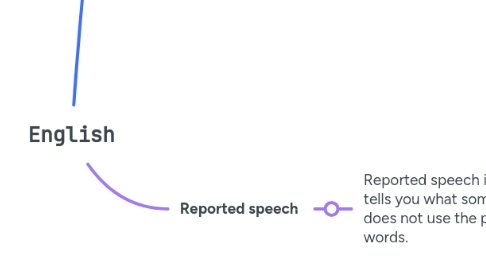
1. Simple present pasive
1.1. Is used when you want to give more importance to the object of the sentence, not the subject.
1.1.1. Affirmative
1.1.1.1. Object + am / is / are + verb (past participle)
1.1.1.1.1. The flowers are watered by the gardener every evening.
1.1.2. Question
1.1.2.1. Am / Is / Are + Object + verb (past participle) ?
1.1.2.1.1. Who are umbrellas sold by?
2. Reported speech
2.1. Reported speech is speech which tells you what someone said, but does not use the person's actual words.
2.1.1. Simple past
2.1.1.1. Narrates events that occurred at a specific time in the past.
2.1.1.1.1. To form the simple past with regular verbs, we use the infinitive and add the ending “-ed”.
2.1.2. Past perfect
2.1.2.1. It is used to refer to an action that happened in the past before another.
2.1.2.1.1. Is formed with the auxiliary verb "to have" and the past participle. The auxiliary verb will be in the past tense.
2.1.3. Past continuous
2.1.3.1. Express actions or states that were taking place in the past when another action or state interrupts or reinforces it.
2.1.3.1.1. Subject + auxiliary verb (to be) + gerund verb (ing) + complement.
2.1.4. Past Perfect continuous
2.1.4.1. It is mainly used to express actions that started at a specific time in the past and continued to another specific point in the past.
2.1.4.1.1. Subject+ auxiliary (had)+been+verb (ing)
2.1.5. Present perfect
2.1.5.1. Expresses experiences or memories that occurred a long time ago.
2.1.5.1.1. Subject+auxiliar(have)+ verb in participio+complement
2.1.6. Would
2.1.6.1. Would is always used accompanied by an infinitive verb, to which it gives the meaning of conditional, that is, the ending. Also, it may be will's past
2.1.6.1.1. He said he would come to my house
2.1.7. Could
2.1.7.1. Used to talk about situations that were possible in the past but did not occur, or about skills that were possessed in the past but not used
2.1.7.1.1. Subject+could+verb+complement
2.1.8. Can
2.1.8.1. It can be used to express ability or opportunity, to request or offer permission, and to show possibility or impossibility.
2.1.8.1.1. Subject+can+verb+complement
2.1.9. Will
2.1.9.1. Is used to express beliefs about the present or future.
2.1.9.1.1. Subject+will+ verb+ complement
2.1.10. Simple present
2.1.10.1. It is a tense in English that is used to express actions, states and general facts in the present.
2.1.10.1.1. Subject + auxiliary do/does + verb + complement.
